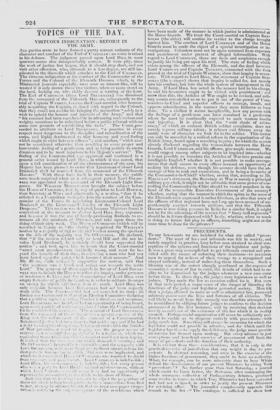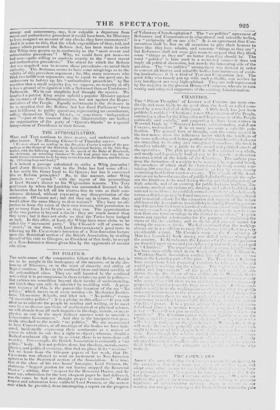PRECE1)ENTS.
To our law-courts we are indebted for what mire called "prece- dents." l'he want of laws and tribunals was felt in society, and rudely supplied in practice, long befine men attained to clear con- ceptions of the spheres and functions of the legislator and judge.
It was a great step accomplished to get tribenals erected and pro- vided with the means or enforcing their decisions—to accustom men to appeal for redress of their wrongs to a recoguized and obeyed authority, instead of redressing them themeelves. Such a blessing was at the outset cheaply purchased at the expense of assuming a system of' law to exist, time details of which had in re- ality to he improvised by time judges whenever a new case came befbre them. In those days, the judges were legislatots as well as judges. They made the law am; occasion called tbr it. But even at that rude period, a vague sense of' the danger of blending the functions of' tile judge and legislator pervaded society. Men felt that a judge, ell•bwed to make as well as administer law, possessed arbitrary power over time lives and flirt mimics of all citizens. The evil likely to result fisen this anomaly was thereffire attempted to be neutralized by obliging future judges to conform to the decision pronounced in the first instance, mid by receiving that decision insely as evideitee of' the existence of' the law which it in reality created. Perhaps social organization will never be sufficiently per- fteled to eneble us to dispense entirely with iwecedents—with judge-made law. Soteethieg will always be occurrieg flw which time legislator could not provide ill advance, and for which until the legislates has I iee• Ii ..eptly the deliriency, the judge must provide an interim law fleeted upon amilogy. But every telvarice in just conceptions end beneficial exercise of government will limit, the range of pesedents and the duratinn of their authority. It is evi•lent front flies considerations, that it is enly in time practical exercise of' jesialletion that ;my weight is due to pre- vedeets. In abstract. reasoning, MO CATII in the exercise of' the flinclitals of government, they ought. to have no authoritY• ‘S'Itat, fi,r example, can be more inimerabie than to hear Whigs defend the shorlemoinT4 of' our present Ministera by citing 'fury " precederde" ? No Initial' gone 111;111 last Saturday, a journal elfish eught, to know better, the Synisimin, :tiler rummaging the wle,le enormous eollection of Parliamentary debates, produced some twelve iii t miii mu n which Tory Ministries had been outvoted. and had not resietted, in order to justify the present Alinister.a for retaining oftic, . journalist complacently appends; this remark to the list—" The catalogue ia sufficient to show how strange and unnecessary, nay, bow culpable a departure from recent and authoritative precedent it %you'd have been, for Ministers to have resigned on account of any checks they have encountered." And it is conic to this, that the whole expenditure of time, toil, and money which procured the Reform Act, has been made in order that Whigs may govern us in conformity to the " most recent and authoritative precedents"! Why, we could have got men—we had men—quite willing to confbrin exactly to the " most recent ancl authoritative precedents." The object for which the Refbrm Act •.vas required was to reverse these precedents—to annul their authority. The Scotsman seems to leave some misgivings as to the validity a this precedent argument ; for, like many reasoners who think two indifferent arguments may be equal to one good one, he endeavours to bolster up his ." authoritative precedents " by ihe assertion that a small majority (Or, we suppose, no majority at all) is less a ground of resignation with a Reformed than an Unreformed Parliament. We in our simplicity had thought the reverse. We imagined a patriot King might uphold a popular Alinister against the creatures of the Boroughmongers, but not against the Repre- sentatives of the People. Equally unibrtutiate is the Scots:mot in its ri:,:aneption that the Refbrm Act lots freed Parliament " from men in.lifierent to public questions, representing no constituents, calling themselves King's frienob, or sometimes 'independent Then '"—,just at the moment that the Ministerialists are hailing the organization of the party of " Queen's friends" as a special interposition of Providence in their flivour.



























 Previous page
Previous page